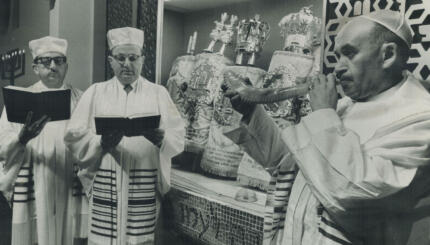Maftir is the last Torah reading. On holidays and special shabbatot, the maftir is a reading from an additional scroll. The maftir for festivals relates the sacrifice brought on that occasion. Similarly, the Yom Kippur maftir notes the offering brought on the day that is Yom Kippur on the calendar.
This English translation is reprinted with permission from Tanakh: The Holy Scriptures published by the Jewish Publication Society.
29:7. On the tenth day of the same seventh month you shall observe a sacred occasion when you shall practice self-denial. You shall do no work.
29:8. You shall present to the LORD a burnt offering of pleasing odor: one bull of the herd, one ram, seven yearling lambs; see that they are without blemish.
With your help, My Jewish Learning can provide endless opportunities for learning, connection and discovery.
29:9. The meal offering with them-of choice flour with oil mixed in-shall be: three-tenths of a measure for a bull, two-tenths for the one ram,
29:10. one-tenth for each of the seven lambs.
29:11. And there shall be one goat for a sin offering, in addition to the sin offering of expiation and the regular burnt offering with its meal offering, each with its libation.
Torah
Pronunced: TORE-uh, Origin: Hebrew, the Five Books of Moses.
Yom Kippur
Pronounced: yohm KIPP-er, also yohm kee-PORE, Origin: Hebrew, The Day of Atonement, the holiest day on the Jewish calendar and, with Rosh Hashanah, one of the High Holidays.


